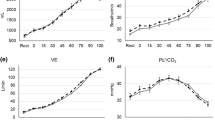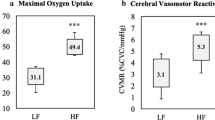Abstract
Purpose
Cognition, cerebral blood flow (CBF) and its major regulator (i.e., arterial CO2), increase with submaximal exercise and decline with severe exercise. These responses may depend on fitness. We investigated whether exercise-related changes in cognition are mediated in part by concomitant changes in CBF and CO2, in ten active (26 ± 3 years) and ten inactive (24 ± 6 years) healthy adults.
Methods
Participants completed two randomised sessions; exercise and a resting CO2-control—wherein end-tidal CO2 (PETCO2) was matched between sessions and clamped across conditions at exercise-associated increases (+ 3 mmHg) and hypercapnia (+ 10 mmHg). Exercise comprised inclined walking at submaximal and severe intensities. CBF was indexed using right middle cerebral artery blood velocity (MCAv). Cognition (visuomotor, switching and inhibitory response time) was measured before, during, and after exercise.
Results
MCAv and its inverted-U response to exercise were comparable between groups, whereas visuomotor performance improved during submaximal exercise in the active group only (p = 0.046). Submaximal, but not severe (p = 0.33), exercise increased MCAv (p ≤ 0.03). Hypercapnia increased MCAv during the CO2-control (27 ± 12%) and during submaximal exercise (39 ± 17%; p < 0.01). Despite the acute increases in MCAv, cognition was impaired during both levels of increased PETCO2 (3–6%; p ≤ 0.04), regardless of session. Overall, resting or exercise-related changes in PETCO2 and MCAv did not associate with changes in cognition (r ≤ 0.29 ± 0.34). Fitness (\(\dot{V}\)O2MAX) was associated with baseline cognition (r ≥ 0.50).
Conclusion
Acute increases in PETCO2 and MCAv were not associated with improved cognition. In fact, cognitive performance was impaired at both levels of increased PETCO2, regardless of session. Finally, fitter people were found to have better cognition.





Similar content being viewed by others
Abbreviations
- ANOVA:
-
Analysis of variance
- aRT:
-
Accuracy-adjusted response time
- BP:
-
Blood pressure
- CBF:
-
Cerebral blood flow
- CO2 :
-
Carbon dioxide
- CVRCO2 :
-
Cerebrovascular reactivity to changes in CO2
- HR:
-
Heart rate
- HRR:
-
Heart rate reserve
- MCAv:
-
Middle cerebral artery blood velocity
- PETCO2 :
-
Partial pressure of end-tidal CO2
- \(\dot{V}\)O2MAX :
-
Maximum rate of oxygen consumption
- VT2 :
-
Second ventilatory threshold
References
Ainslie PN et al (2008) Elevation in cerebral blood flow velocity with aerobic fitness throughout healthy human ageing. J Physiol 586:4005–4010. https://doi.org/10.1113/jphysiol.2008.158279
Al-Khazraji BK, Shoemaker LN, Gati JS, Szekeres T, Shoemaker JK (2018) Reactivity of larger intracranial arteries using 7 T MRI in young adults. J Cereb Blood Flow Metab. https://doi.org/10.1177/0271678x18762880
Bailey DM, Marley CJ, Brugniaux JV, Hodson D, New KJ, Ogoh S, Ainslie PN (2013) Elevated aerobic fitness sustained throughout the adult lifespan is associated with improved cerebral hemodynamics. Stroke 44:3235–3238
Brisswalter J, Arcelin R, Audiffren M, Delignieres D (1997) Influence of physical exercise on simple reaction time: effect of physical fitness. Percept Mot Skills 85:1019–1027
Brisswalter J, Collardeau M, René A (2002) Effects of acute physical exercise characteristics on cognitive performance. Sports Med 32:555–566. https://doi.org/10.2165/00007256-200232090-00002
Brugniaux JV, Marley CJ, Hodson DA, New KJ, Bailey DM (2014) Acute exercise stress reveals cerebrovascular benefits associated with moderate gains in cardiorespiratory fitness. J Cereb Blood Flow Metab 34:1873–1876
Chambers CD, Stokes MG, Mattingley JB (2004) Modality-specific control of strategic spatial attention in parietal cortex. Neuron 44:925–930
Chang YK, Labban JD, Gapin JI, Etnier JL (2012) The effects of acute exercise on cognitive performance: a meta-analysis. Brain Res Bull 1453:87–101. https://doi.org/10.1016/j.brainres.2012.02.068
DeFina LF, Haskell WL, Willis BL, Barlow CE, Finley CE, Levine BD, Cooper KH (2015) Physical activity versus cardiorespiratory fitness: two (partly) distinct components of cardiovascular health? Prog Cardiovasc Dis 57:324–329
Dietrich A (2006) Transient hypofrontality as a mechanism for the psychological effects of exercise. Psychiatry Res 145:79–83
Dulla CG, Dobelis P, Pearson T, Frenguelli BG, Staley KJ, Masino SA (2005) Adenosine and ATP link PCO2 to cortical excitability via pH. Neuron 48(6):1011–1023
Dupuy O et al (2015) Higher levels of cardiovascular fitness are associated with better executive function and prefrontal oxygenation in younger and older women. Front Hum Neurosci. https://doi.org/10.3389/fnhum.2015.00066
Edvardsen E, Hem E, Anderssen SA (2014) End criteria for reaching maximal oxygen uptake must be strict and adjusted to sex and age: a cross-sectional study. PLoS ONE 9:e85276
Etnier JL, Nowell PM, Landers DM, Sibley BA (2006) A meta-regression to examine the relationship between aerobic fitness and cognitive performance. Brain Res Rev 52:119–130
Fernandes RM, Correa MG, Santos MA, Almeida APC, Fagundes NC, Maia LC, Lima RR (2018) The effects of moderate physical exercise in adult cognition: a systematic review. Front Physiol 9:667
Fothergill D, Hedges D, Morrison J (1991) Effects of CO2 and N2 partial pressures on cognitive and psychomotor performance. Undersea Biomed Res 18:1–19
Gertz K et al (2006) Physical activity improves long-term stroke outcome via endothelial nitric oxide synthase–dependent augmentation of neovascularization and cerebral blood flow. Circ Res 99:1132–1140
Guiney H, Lucas SJ, Cotter JD, Machado L (2015) Evidence cerebral blood-flow regulation mediates exercise-cognition links in healthy young adults. Neuropsychology 29:1–9. https://doi.org/10.1037/neu0000124
Hardy CJ, Rejeski WJ (1989) Not what, but how one feels: the measurement of affect during exercise. J Sport Exerc Psychol 11(3):304–317
Kaminsky LA, Arena R, Myers J (2015) Reference standards for cardiorespiratory fitness measured with cardiopulmonary exercise testing: data from the Fitness Registry and the Importance of Exercise National Database. In: Mayo Clinic Proceedings, vol 90, no 11. Elsevier, pp 1515–1523
Karavidas MK, Lehrer PM, Lu SE, Vaschillo E, Vaschillo B, Cheng A (2010) The effects of workload on respiratory variables in simulated flight: a preliminary study. Biol Psychol 84:157–160. https://doi.org/10.1016/j.biopsycho.2009.12.009
Koo TK, Li MY (2016) A guideline of selecting and reporting intraclass correlation coefficients for reliability research. J Chiropr Med 15:155–163
Kramer AF, Erickson KI, Colcombe SJ (2006) Exercise, cognition, and the aging brain. J Appl Physiol 101:1237–1242
Krause DN, Duckles SP, Pelligrino DA (2006) Influence of sex steroid hormones on cerebrovascular function. J Appl Physiol 101:1252–1261
Lambourne K, Tomporowski P (2010) The effect of exercise-induced arousal on cognitive task performance: a meta-regression analysis. Brain Res 1341:12–24
Madsen PL et al (1993) Middle cerebral artery blood velocity and cerebral blood flow and O2 uptake during dynamic exercise. J Appl Physiol 74:245–250
Marangoni AH, Hurford DP (1990) The effect of varying alveolar carbon dioxide levels on free recall. Brain Cogn 13:77–85
McKay G, Banister E (1976) A comparison of maximum oxygen uptake determination by bicycle ergometry at various pedaling frequencies and by treadmill running at various speeds. Eur J Appl Physiol Occup Physiol 35:191–200
McMorris T, Hale BJ (2012) Differential effects of differing intensities of acute exercise on speed and accuracy of cognition: a meta-analytical investigation. Brain Cogn 80:338–351. https://doi.org/10.1016/j.bandc.2012.09.001
Naqvi TZ, Hyuhn HK (2009) Cerebrovascular mental stress reactivity is impaired in hypertension. Cardiovasc Ultrasound 7(1):32
Ogoh S, Ainslie PN (2009) Cerebral blood flow during exercise: mechanisms of regulation. J Appl Physiol 107:1370–1380. https://doi.org/10.1152/japplphysiol.00573.2009
Ogoh S, Tsukamoto H, Hirasawa A, Hasegawa H, Hirose N, Hashimoto T (2014) The effect of changes in cerebral blood flow on cognitive function during exercise. Physiol Rep. https://doi.org/10.14814/phy2.12163
Pereira AC et al (2007) An in vivo correlate of exercise-induced neurogenesis in the adult dentate gyrus. Proc Natl Acad Sci 104:5638–5643
Sheehy JB, Kamon E, Kiser D (1982) Effects of carbon dioxide inhalation on psychomotor and mental performance during exercise and recovery. Hum Factors 24:581–588
Shoemaker LN, Wilson LC, Lucas SJ, Machado L, Cotter JD (2019) Cerebrovascular regulation is not blunted during mental stress. Exp Physiol 104(11):1678–1687
Smith KJ, Ainslie PN (2017) Regulation of cerebral blood flow and metabolism during exercise. Exp Physiol 102:1356–1371. https://doi.org/10.1113/ep086249
Stimpson NJ, Davison G, Javadi A-H (2018) Joggin’the noggin: towards a physiological understanding of exercise-induced cognitive benefits. Neurosci Biobehav Rev 88:177–186
Tomporowski PD (2003) Effects of acute bouts of exercise on cognition. Acta Psychol (Amst) 112:297–324
Townsend JT, Ashby FG (1983) Stochastic modeling of elementary psychological processes. CUP Archive
White N, Forsyth B, Lee A, Machado L (2017) Repeated computerized cognitive testing: performance shifts and test–retest reliability in healthy young adults. Psychol Assess 30:539
Xu F et al (2011) The influence of carbon dioxide on brain activity and metabolism in conscious humans. J Cereb Blood Flow Metab 31:58–67. https://doi.org/10.1038/jcbfm.2010.153
Zappe AC, Uludag K, Oeltermann A, Ugurbil K, Logothetis NK (2008) The influence of moderate hypercapnia on neural activity in the anesthetized nonhuman primate. Cereb Cortex 18:2666–2673. https://doi.org/10.1093/cercor/bhn023
Acknowledgements
We thank our participants for their time and effort; Nigel Barrett and Gavin Kennedy for their technical support and expertise; Dr. Ashley Akerman for his help in data collection; and the School of Physical Education, Sport and Exercise Sciences and Department of Medicine for funding support.
Author information
Authors and Affiliations
Contributions
All authors contributed to the study conception and design and interpretation of results. Data collection and analysis were performed by LNS, LCW and JDC. The first draft of the manuscript was written by LNS and all authors commented on previous versions of the manuscript. All authors read and approved the final manuscript.
Corresponding author
Ethics declarations
Conflict of interest
The authors declare that they have no conflict of interest.
Additional information
Communicated by I. Mark Olfert.
Publisher's Note
Springer Nature remains neutral with regard to jurisdictional claims in published maps and institutional affiliations.
Rights and permissions
About this article
Cite this article
Shoemaker, L.N., Wilson, L.C., Lucas, S.J.E. et al. Acute exercise-related cognitive effects are not attributable to changes in end-tidal CO2 or cerebral blood velocity. Eur J Appl Physiol 120, 1637–1649 (2020). https://doi.org/10.1007/s00421-020-04393-7
Received:
Accepted:
Published:
Issue Date:
DOI: https://doi.org/10.1007/s00421-020-04393-7




